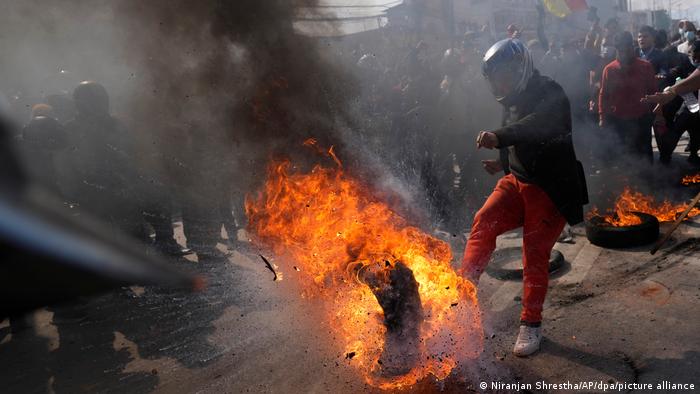
Protesters clashed with riot police outside Nepal's Parliament on Sunday in opposition to plans to approve infrastructure projects funded by the United States.
Lawmakers have begun debating the deal, which will see the Himalayan country receive $500 million (€441 million) in grants from Washington's anti-poverty project, the Millennium Challenge Corporation (MCC).
What happened during the protests?
Hundreds of protesters gathered outside the Parliament building in Kathmandu in opposition to the US grant.
At several points, demonstrators tried to push through barricades and pelted riot police with stones.
Officers beat them with bamboo batons, deploying tear gas and water cannons.
Several people were injured on both sides.
What is the Millennium Challenge Corporation (MCC)?
The Millennium Challenge Corporation (MCC) was created by the US Congress in 2004 to offer large grants to support economic growth in low-income countries.
Nepal relies heavily on foreign aid, and in 2017, the MCC agreed to provide the country with $500 million in grants to fund a 300-kilometer (187-mile) electricity transmission line and a road improvement project.
The US Embassy in Nepal described the grant as "a gift from the American people and a partnership between our nations that will bring jobs and infrastructure to Nepal and improve the lives of Nepalis."
"This project was requested by the Nepali government and the Nepali people and designed to transparently reduce poverty and grow the economy," a US Embassy statement issued late on Saturday said.
Why is the grant so contentious?
Ratification has been in limbo because of divisions within political parties, including two of the Communist parties — seen as traditionally close to China — that are part of the coalition government.
They claim the conditions in the grant agreement will prevail over Nepalese law and that lawmakers would have insufficient oversight of the board directing the infrastructure projects.
The opponents say the aid forms part of Washington's Indo-Pacific strategy, which has military components that could bring American soldiers to the Himalayan nation.
Nepalese government officials said the grant will not have to be repaid and has no conditions attached.
Indian daily the Hindustan Times reported on Tuesday that Washington believes China is behind a disinformation campaign against the pact.
Nepal is part of China's huge infrastructure project, the Belt and Road Initiative, dubbed the New Silk Road.
US officials have spoken to Nepalese leaders recently to assure that the grant concerns only Nepal's development.
But after a US diplomat recently put pressure on politicians to back the plan, Beijing said it opposes "coercive diplomacy and actions that pursue selfish agendas at the expense of Nepal's sovereignty and interests."
How is the plan progressing through Parliament?
Government Minister Gyanendra Bahadur Karki presented the grant proposal on Sunday, saying the grant "will be an important tool for the socio-economic development of the country."
Karki added that the projects would benefit 24 million of Nepal's 30 million population.
The discussion was originally planned for last Wednesday but disagreements among political parties and clashes with police outside Parliament led to it being postponed.
Several lawmakers chanted slogans opposing the measure and a thick line of security personnel blocked the protesting members from approaching the minister.
The debate is expected to last several days before the grant agreement is put to a vote.
A US deadline to pass the plan looms at the end of the month.